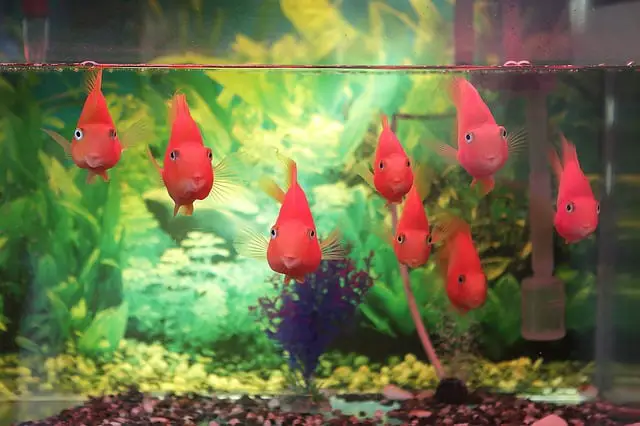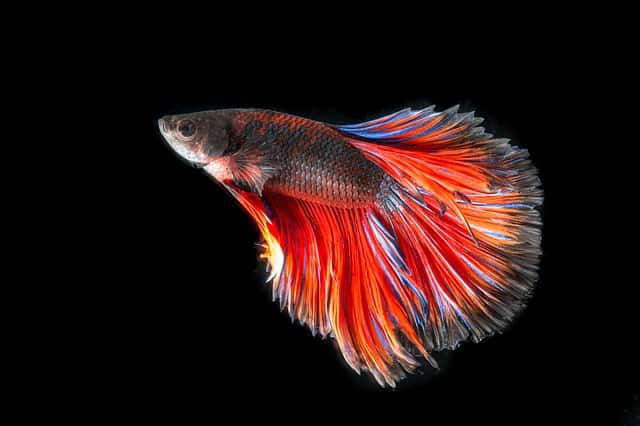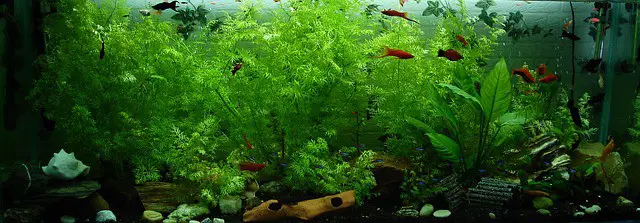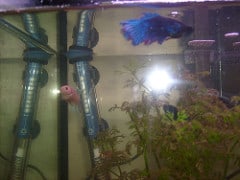It is amazing how important things that support life are and how you can make a mistake and not provide the proper life support your fish need. Guppies like any other tropical fish require specific water parameters. It all depends on where the fish originated from and educating yourself on your guppies’ water requirements will offer the fish a healthy environment to thrive in.
Guppies can live in tap water only if the water has been de-chlorinated and treated for fish. Before using tap water, it is important to use a water conditioner. A biological enhancer can also be used to help eliminate ammonia and nitrite. Using a biological enhancer will also provide beneficial bacteria to the fish tank.
I know some hobbyists throw caution to the wind and will pour tap water directly from the tap into their tropical fish tanks and I just, would not recommend you do that. It can be dangerous to your guppies. It is not just that, if the water has not been treated then the temperature alone could cause the fish undue stress. You do not want to breathe toxic air and your guppies do not want toxic water.
For the rest of this article, I will discuss different things you should consider regarding your guppies living in tap water (or not).
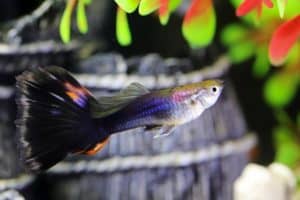
How Long Can a Fish Survive in Tap Water?
We all live in different regions of the world and our tap water will vary in how it was treated for safe human consumption. Some regions add fluoride, and some do not. The mineral content will differ as well. I know this from experience.
A few years ago, I moved from a major city to a small town 10 miles away and the water being supplied to my region comes from a different source than the municipality I moved from. My water is now supplied by an aquifer and is high in mineral count.
The levels are so high in fact that I have had to replace a kitchen faucet and gaskets in my toilet tanks because of the deposit build up. That reminds me, I also had to replace a shower faucet as well this past winter, which I chalk up to the water.
The reason I am telling you these personal things is to stress my point that water provided to you and me can are most likely quite different. This means that one water source in a specific area may support guppy health whereas another might not. It all boils down to the mineral composition of the water.
If we think about tap water that has been treated by a water plant, we know there has most likely been chemicals used. Residue of this process might still flow in our tap water. Here is the situation where I think that guppies or other tropical fish could have a higher success rate of surviving tap water.
- Let the water sit for at least a full day to allow any chlorine to dissipate.
- Place the tap water in a large container in a place where it will get to or above room temperature.
You should use at minimum a water conditioner like this one. However, if you chose not to and pour tap water directly into your fish tank, I think a good majority of fish will still survive. You do increase the chance of the fish going into shock though and eventually getting sick and dying.
I cannot say for certain that I did not make this mistake years ago when I was first starting out as an aquarium hobbyist because I know I probably did. I also remember losing more fish more often back then.
What Kind of Water Do Guppies Need?
After all this talk about how tap water could shock and kill your guppies, you must think tap water is the worst ever, but its not. It can cause stress and problems right out of the tap. It is just important for you to know that. So, what is the optimal water for your guppies you ask?
Tap water is okay to use providing you prepare it properly for your guppy tank. Fact is, if you use reverse osmosis or distilled water you are taking all of the valuable minerals out of the water which are beneficial to all of your tanks inhabitants including any live plants you might have. These processes also take all the bad parts of the water out as well, but you get the point.
Here are what your guppies water parameters should be.
- PH level for your guppy tank should be in what we call the normal range. Normal being not to acid and not to alkaline. If you have a PH tester, you want to be somewhere between 6.8 to 7.8. Luckily, most tap waters run in this range, so you will not have to adjust the PH on your own. If you find your tap water levels are too high, you must do more frequent water changes to lower the PH. I have an excellent article on water changes here.
- To adjust PH levels, you can also use chemical formulas available at most local fish stores. You can also purchase these on sites such as Amazon. Here is an example of a product that will set your PH to 7.0.
- There are also products available to either raise or lower your PH.
- The other thing to consider when adding tap water to your fish tank is the temperature. Pouring cold water right out of the tap into your fish tank can shock your fish. You probably have your tank’s water temperature set somewhere around 72 Fahrenheit.
- If you stick your finger in the water, you can feel how much warmer it feels compared to the air around you. At minimum, you want to let your tap water warm up to room temperature. If you can let it sit somewhere in sunlight or another spot that is typically warmer than the rest of your home, do that. The closer you can get the new water to the tank’s temperature, the better for your fish.
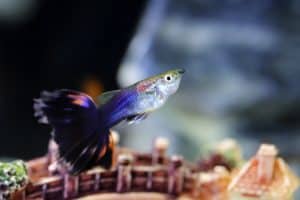
How Often Should You Change Water for Guppies?
Changing water helps to lower PH levels in your fish tank. When you change water, you are taking out nitrates, ammonia, and other toxins, This, helps lower and reset the PH for a healthier tank.
I recommend doing a water change every 7 to 10 days. If your tank is heavily stocked, go with every 7 days and if you have minimal fish once every 10 days or so, is fine.
Aim to change out approximately 25% of the water each time. I know I said previously to not use RO water but truth be known, if you use a small amount once in awhile, it helps your tank because you are not adding so many minerals all of the time.
Can I Add a Water Conditioner While the Fish Are in The Tank?
I would never add a water conditioner directly to your fish tank. Apply the water conditioner to your container you have your tap water in before it goes into your aquarium. There are some additives that go right into a fish tank as suggested by the manufacturer, however, this is one of those ones where you do not do that.
Conclusion
Once you understand that tap water going straight from the tap to the fish tank is not the safest for your guppies, then you will be able to plan better on how to keep your fish safe.
Guppies can live in tap water, as long, as it meets the proper PH level and the water has been treated to take out harmful chemicals like chlorine.
The tap water should also be warmed up slightly so as not to shock your fish. Shocking the fish can cause them stress and if they are stressed, they get sick much more easily.
Good luck!
Related Aquariums at Home Articles
Do Guppies Need a Filter to Survive?
What Do Guppies Need to Breed?
25 Most Popular Freshwater Fish for Aquarium
Is RO Water Safe for Freshwater Fish
Can You Add a Water Conditioner While Fish Are in The Tank?



